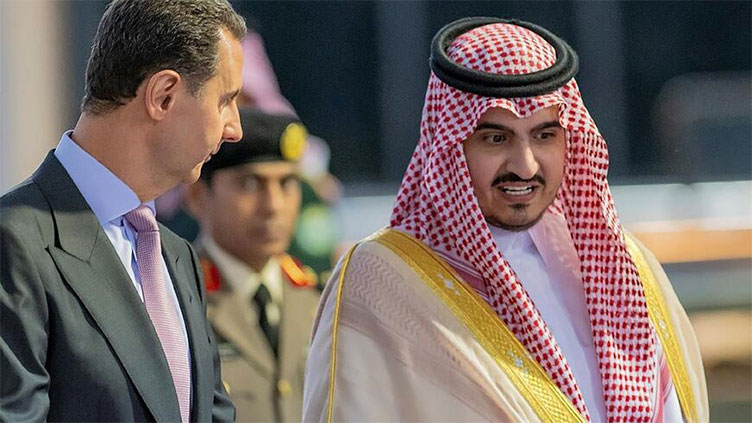Syria's Assad lands in Saudi Arabia for summit: state TV

World
Syrian President Bashar al-Assad arrived in Saudi Arabia on Thursday.
JEDDAH (Saudi Arabia) (AFP) – Syrian President Bashar al-Assad arrived in Saudi Arabia on Thursday, state media said, to join an Arab League summit for the first time in more than a decade of war.
The visit seals Assad's dramatic return to the Arab fold, a development championed by host Saudi Arabia and fellow Gulf power the United Arab Emirates despite reservations from other Arab leaders.
Assad "arrived at King Abdulaziz International Airport in Jeddah to participate in... the Arab League summit" to be held Friday, Syrian state television reported.
Saudi state-affiliated channel Al-Ekhbariya showed footage of a smiling Assad disembarking from a plane and being greeted on the tarmac by Prince Badr bin Sultan, deputy governor of Mecca region, where Jeddah is located.
The Arab League suspended Damascus in November 2011 over its bloody crackdown on protests, which triggered a conflict that has gone on to kill more than 500,000 people and displace millions more.
Saudi Arabia and other Arab countries either severed or downgraded ties with Assad at the time -- with Riyadh long openly championing his ouster.
But earlier this month, the 22-member pan-Arab body welcomed Damascus back and Saudi Arabia invited Assad to Jeddah, the latest in a series of high-profile diplomatic twists reshaping the region in recent months.
Syrian pro-government newspaper al-Watan said Assad would likely meet "a number of leaders in bilateral meetings" Thursday evening and Friday morning.
The last Arab League summit Assad attended was in 2010 in Libya.
ARAB EMBRACE
Regional capitals have gradually been warming to Assad as he has held onto power and clawed back lost territory with crucial support from Iran and Russia.
In 2018, the United Arab Emirates re-established ties with Syria, and it has been leading the charge to reintegrate Damascus.
It has also invited Assad to attend the UN climate summit in Dubai later this year, Syrian official news agency SANA reported on Monday.
In March 2022, Assad visited the UAE on his first official trip to an Arab country since the war began.
He has also visited Oman, Iran and Russia in recent years.
Arab outreach to Assad picked up pace after a deadly earthquake struck Syria and Turkey on February 6.
A decision in March by Saudi Arabia and Iran to resume ties has also shifted the Middle Eastern political landscape.
Riyadh, which cut ties with Assad's government in 2012, confirmed last week that work would resume at the two countries' respective diplomatic missions.
Not every country in the region has been eager to mend ties with Assad.
Qatar said this month it would not normalise relations with Assad's government but also noted this would not be "an obstacle" to Arab League reintegration.
On Thursday, the emir of Qatar, a fierce critic of the Syrian leader, announced he would lead the Gulf state's delegation.
While the Qatari government has called for accountability for "war crimes" in Syria, the emir made no comment on Qatar's expectations for the summit.
'RECONSTRUCTION' PUSH
Syria's front lines have mostly quietened, but large parts of the north remain outside government control, and no political solution to the conflict is in sight.
Officials at several recent meetings have said Arab leadership is needed to find a settlement.
The fate of millions of Syrian refugees -- many of them living in neighbouring Turkey, Jordan and Lebanon -- are among some states' main concerns.
Several Arab countries are also seeking increased security cooperation with Syria, which critics say has turned into a narco-state with a $10 billion captagon industry, mostly trafficked to the Gulf.
Assad is hoping full normalisation of ties with wealthy Gulf monarchies and other Arab states will help finance reconstruction.
Following a preparatory meeting in Jeddah on Wednesday, Syrian Foreign Minister Faisal Mekdad said "reconstruction will facilitate (refugee) returns, and we welcome any Arab role in this field."
"We are not going to normalise relations with the Assad regime and we certainly don't support others doing that as well," State Department spokesman Vedant Patel told reporters in Washington on Wednesday.

